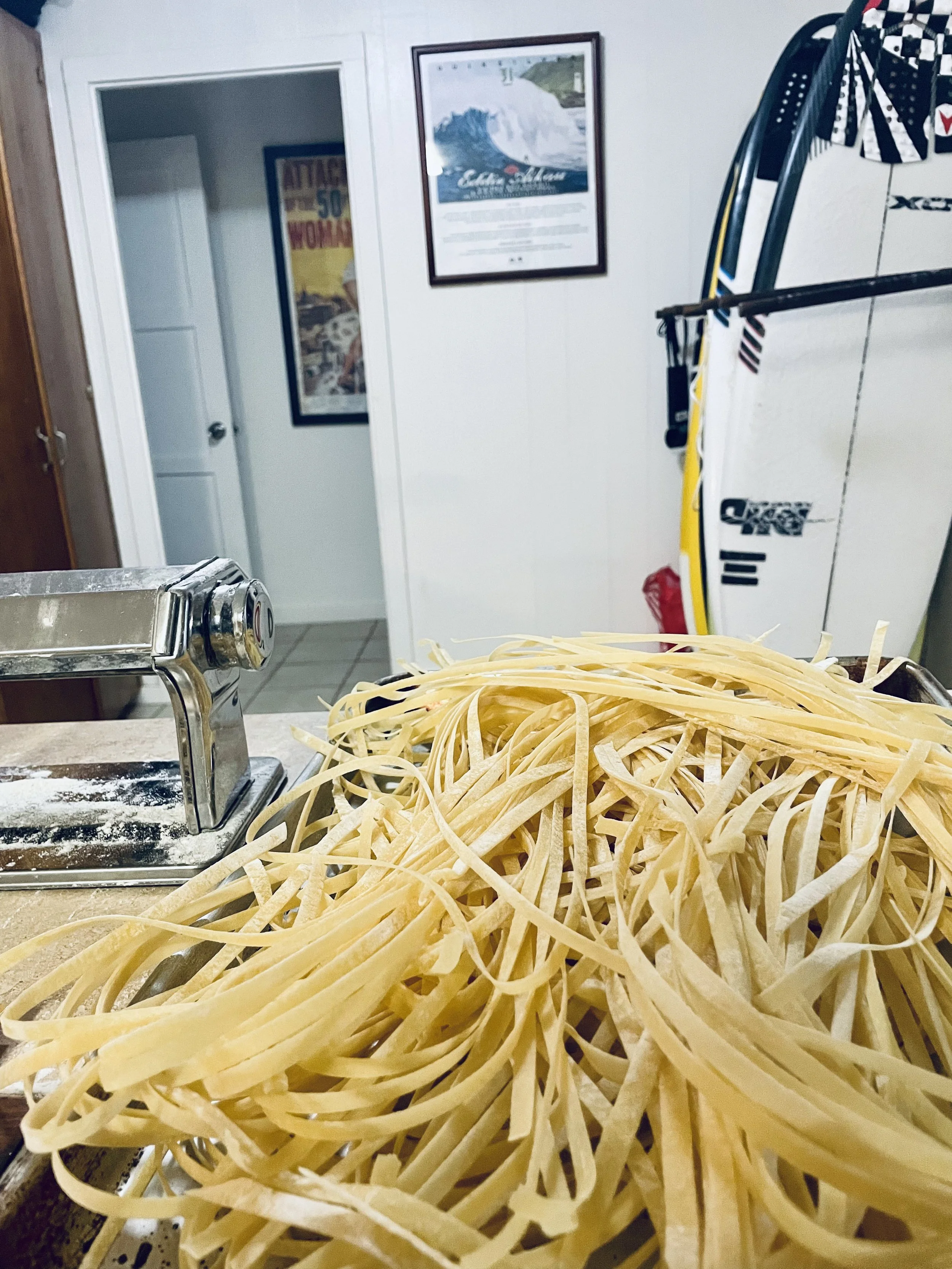Fresh Pasta Recipe
Fresh pasta - the sweet golden carbs that fill us up and nourish our soul. Wherever you fall on the carb-eating spectrum, you must try this recipe. This one is tried & true. It is a simple fettuccine and works well with so many sauces.
Special Equipment
Pasta Machine: The pasta machine pictured above is a simple hand-crank one that I found for only $25. They are affordable and last forever. Just be sure not to immerse them in water, when cleaning.
Stand Mixer: A stand mixer is helpful, but not necessary. If you have one, be sure to use the dough hook.
A Drying Rack: Someplace to hang your pasta is essential. I use my surf rack to dry my pasta. But, other options include, the backs of a couple chairs, a wooden clothes drying rack, or just lying them flat on the counter with plenty of flour.
My son loves helping with the fresh pasta
Fresh Pasta Ingredients
Flour: There are a few options when it comes to flour for pasta. To start, All purpose (AP) flour works very well. Other options include: bread flour or 00 flour. 00 (Double zero) flour can be found in specialty stores. Or, if you live in Hawaii, online.
Eggs: Use fresh and local eggs if possible. And, be sure to bring them to room-temperature before use.
Olive Oil: High-quality olive oil really makes a difference. At least try to get something priced in the middle range. There are only four ingredients in fresh pasta, so make each one count.
Roll out the Dough

Fresh Pasta Recipe
Ingredients
- 2⅔ Cup flour (all purpose flour, bread flour, or “00” flour)
- 4 eggs (use at room temperature)
- 2 Tbsp olive oil (extra virgin)
- ½ Tsp salt
Instructions
- Place the flour in a large bowl and make a well in the center. (It is best to sift the flour into the bowl, if you have a fine mesh strainer). Add the eggs, oil, and ½ teaspoon salt to the well and work the flour into the liquid with a fork, little by little, until a dough forms. Depending on the size of your eggs, you may not need all the flour, or you may need a little more, if the dough is sticky.
- Turn the dough out of the bowl onto a work surface and knead it until you can form it into an elastic ball, about 6 minutes.
- Wrap the dough in plastic wrap and let stand at room temperature for 1 hour.
- Place the flour in a large bowl and make a well in the center. (It is best to sift the flour into the bowl, if you have a fine mesh strainer). Add the eggs, oil, and ½ teaspoon salt to the well and set your mixer to low, using a dough hook. Mix for 6-8 minutes. Be sure to scrape the dough down the sides of the bowl, as needed. Depending on the size of your eggs, you may not need all the flour, or you may need a little more, if the dough is sticky.
- Turn the dough out of the bowl onto a work surface and knead it into a ball. Then, wrap the dough in plastic wrap and let stand at room temperature for 1 hour.
- Cut the dough into quarters and dust each piece with flour. Keep the other pieces of dough covered with a kitchen towel while you work with one piece at a time. Using a pasta machine, roll 1 piece of dough through the widest setting 5 - 6 times, folding the dough in half and dusting it lightly with flour as necessary between each pass.
- Adjust the rollers to the next narrower setting and pass the dough through the rollers twice (without folding). Continue to roll the dough through each smaller setting (2x per setting) - until you get to the number 6 or 7. When choosing how thin to roll your pasta out, think about what kind of sauce you are using. For thicker sauces I like to roll it out to a 6 and pass it through twice. For a lighter sauce, I will roll it out to a 7 and pass it through once.
- Cut the pasta into the desired shape, tossing it with additional four to prevent it from sticking. Cook the pasta right away or hang it over a drying rack until dry. The dried pasta keeps well at room temperature until you are ready to use it.
Notes
Special Equipment:
- Stand mixer (optional)
- Drying rack
- Pasta machine




